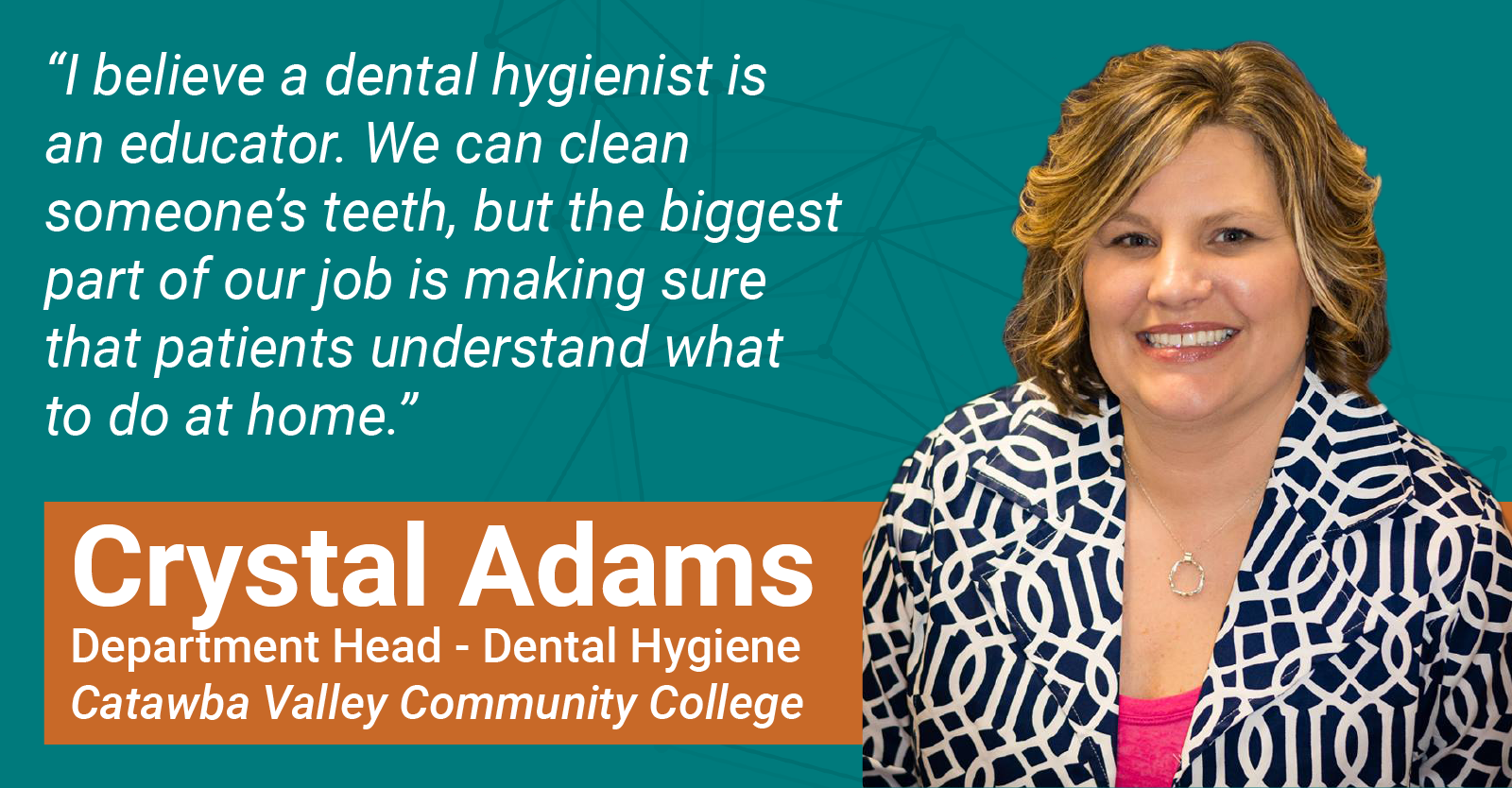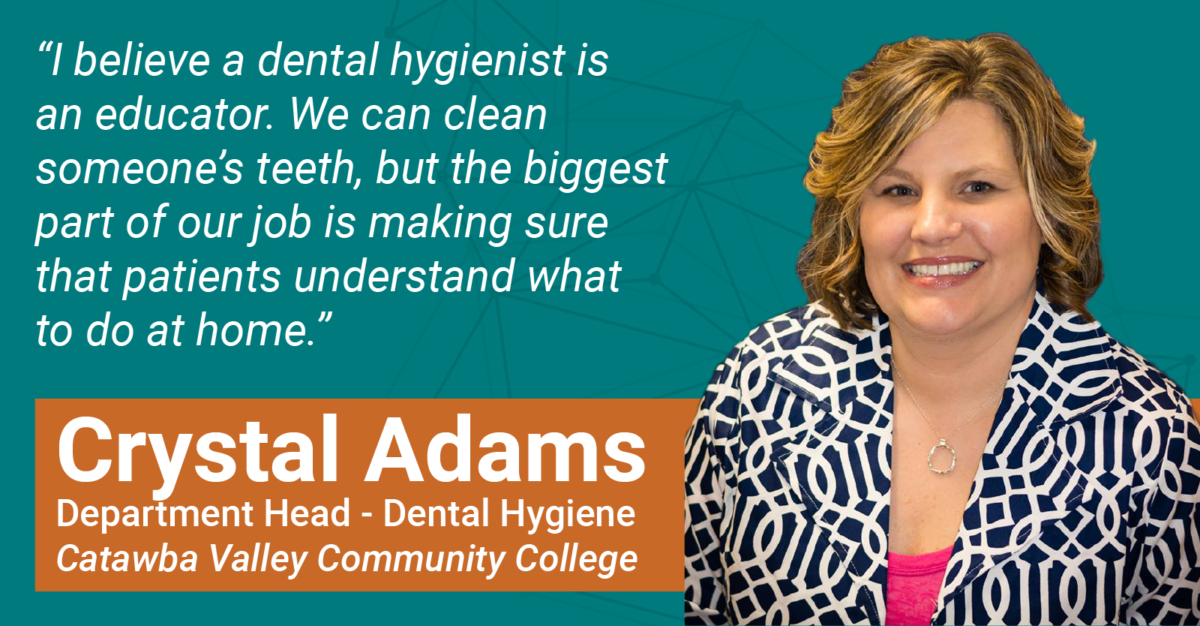
Last week was National Dental Hygienists Week, so we sat down (virtually) with Crystal Adams, a dental hygienist and dental hygiene program director at Catawba Valley Community College (CVCC), for a conversation about her career path and the importance of hygienists in the dental home.
Adams is a passionate advocate for oral health care with an inspiring drive to improve the lives of those who traditionally cannot access care. She has important insight into the role that hygienists play in the dental home, and she has worked in several capacities to modernize North Carolina’s regulatory framework.
In our interview, we discussed Adams’ path to becoming a dental hygienist, the important services that hygienists provide, and changes that could be made to better allow hygienists to serve their communities.
When did you decide that you wanted to be a dental hygienist?
When I graduated high school, I knew I eventually wanted to be a dental hygienist, but first I went the dental assisting route. I graduated from Wilkes Community College with my dental assisting diploma and then I worked for four years in a private practice as a dental assistant.
I had the urge to continue my education, though, and the dentist I worked for allowed me to leave work early to take prerequisite courses at CVCC to prepare for the dental hygiene program. I attended the Dental Hygiene Program at Central Piedmont Community College (CPCC) in Charlotte — I commuted from Alexander County to Charlotte for two years — and graduated in 2001. From there I went back, as a dental hygienist, to the practice I had worked at before my education at CPCC.
What are the education requirements to become a dental hygienist?
A dental hygienist has to take prerequisite courses — they have about a year and a half of prerequisites that they have to take, in addition to the two-year dental hygiene curriculum. Most programs like for students to take those prerequisites prior to starting the dental hygiene curriculum because it is so demanding. It’s a lot of work.
So, it’s a year and a half of prerequisites and then two years of curriculum. It’s very close to being a bachelor’s degree. I think that’s something that is important for people to understand. It’s more than just a two-year program. It’s really closer to three and a half with the prerequisites.
Why did you want to pursue dental hygiene for your career?
I didn’t have dental care when I was young. My parents didn’t have that oral health literacy. So, this was an area where I knew that I could help, especially in my community. There are a lot of people in my community that don’t understand oral health care.
In your view, what is a dental hygienist? What role do they serve in the dental office, and how has that allowed you to serve your community and improve patients’ understanding of oral health care?
I believe a dental hygienist is an educator. We can clean someone’s teeth, but the biggest part of our job is making sure that patients understand what to do at home. We make sure they’re taking care of their needs so that whenever they come in we can focus on preventing things from happening instead of treating something that has already gone wrong. So, I feel like we are prevention specialists, and our number one role is education.
So, education was a big part of your role in private practice. Now you are full-time at Catawba Valley Community College. Is the role of educator what led you to the community college setting?
Once I started practicing as a dental hygienist, I still had that drive to help even more. I started working part time at Catawba Valley Community College and I just loved sharing my knowledge and skills, and I loved seeing the students grow.
Once I started teaching, I decided to continue my education and get my bachelor’s degree and master’s degree. I was able to get a full-time teaching position at CVCC, and eventually I became the director of the program, which has allowed me to serve in several capacities at the state level, as well as serving as the president of the North Carolina Dental Hygienists Association.
Something that we have been putting a lot of thought into at NCOHC is the disparity between dentists and hygienists in terms of volume. There is a growing shortage of dentists as they are aging out and retiring faster than our universities are graduating new dentists. Simultaneously we have a growing surplus of hygienists. How is this impacting the hygienist workforce?
I think this is a big problem, and I think the most important thing here is that hygienists aren’t able to use the skillset in North Carolina that they are taught to use. They could be serving local communities where there aren’t many dentists, and we could be providing care to individuals who don’t normally get care.
I think if we could go to more of a general supervision model and actually use the skills we are taught, then we would be able to serve more of the underserved communities in our state that don’t get care.
The recent change to Rule 16W seems to be a step in that direction, to allow dental hygienists to go into underserved areas and provide care with a written standing order from a dentist, without the dentist being physically present. Could you speak briefly from the hygienist’s perspective about what the rule change means for oral health care in North Carolina?
I think it is a really positive direction for our state. The rule change allows hygienists to get more involved in school settings, nursing homes, and long-term care settings where we can actually use our skills to the full extent of our training. It gives us the ability to serve communities when dentists are not as available to be physically present, and I think it is a step toward allowing us to be the professionals we are intended to be.
Are there other skills that hygienists are taught in school that you are not allowed to practice under North Carolina’s regulatory framework?
Yes. So, that’s a bit of a tricky question because we are taught the theory of local anesthesia, but since it is not a delegable duty in North Carolina, we don’t teach the skill portion. But we are taught local anesthesia.
Hygienists in other states can administer local anesthesia. If North Carolina began to allow this here, what change would need to happen on the education level? Would beginning to teach the skill portion be a big change?
We already incorporate pretty much all of the education into the dental hygiene program because our students have to test on the national level. Anesthesia is included in that testing because so many states do allow hygienists to administer local anesthesia.
The extra step of teaching the skill portion would not be difficult to incorporate into our programs at all, because the foundation is already there.
If you could snap your fingers and change anything in North Carolina’s regulatory framework, what would it be?
If I could change anything, I would allow hygienists to administer local anesthesia. Additionally, I would expand the change that has already been made to rule 16W for indirect supervision to allow hygienists to use their skills when the dentist is not on the premises in more settings.
I think those changes would allow us to actually perform what we are taught in school and to be the professionals we are meant to be. So, local anesthesia and relaxation on supervision to allow us to treat more people when the dentist is unavailable.
NCOHC is a program of the Foundation for Health Leadership & Innovation. For more information and to stay up to date, subscribe to the NCOHC newsletter. If you are interested in becoming an NCOHC member, you can also fill out our membership form. It’s free!


